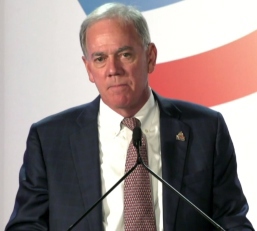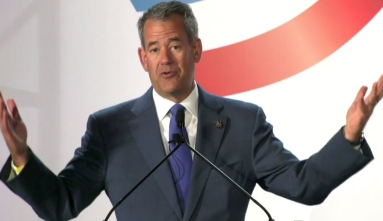2021 AFPM Annual Meeting Virtual Edition: Persevering through unprecedented challenges with a focus on sustainability
Opening Remarks and President’s Report
Author: MIKE RHODES, Managing Editor, Hydrocarbon Processing
The 2021 AFPM Annual Meeting Virtual Edition kicked off Monday morning both virtually and, for a small number of board members and special guests, live in San Antonio, Texas.
Opening Remarks. Following a brief video history, the 118th Annual Meeting was called to order by Joe Gorder, President and CEO, Valero Energy Corp. “The last 12 months have been characterized by unprecedented challenges,” Gorder said, “but we have persevered, as our incredible industries always do. I’m incredibly proud of how our teams responded, coming to work each day and producing the critical products for PPE and frontline supplies used in the fight against COVD-19, and supplying the fuels that enable the delivery of everything we need to sustain our lives during these trying times.”
Gorder explained that during his long industry experience, he has seen many ups and downs, and what works and what doesn’t. He asserted that he has no doubt that the things the industry is doing now are working. “We are better because of the collective work we have done—and continue to do—through AFPM. Together, we’ve tackled technical issues, improved the safety and efficiencies of our processes by sharing best practices and solutions, and we have improved our environmental and sustainability performance, as well.”

Joe Gorder, President and CEO, Valero Energy Corp.
He stressed the critical contributions the downstream industry is making to society, and how the industry is committed to advancing the safety and health of its employees, communities and the environment. “The work we do and the products we make drive economic growth,” Gorder said.
On Tuesday, Gorder will “turn the gavel over to” Jeff Ramsey of Flint Hills Resources. “It has been an honor to work with Chet Thompson and the incredible team he has assembled, as well as my fellow board members, while serving in this capacity.”
“No other organization pulls together leaders from inside and outside our industries like AFPM. We are able to work through the hard issues, discuss differing opinions and, ultimately, come together more unified to highlight the amazing work our industries do each and every day,” he said.
Gorder closed by thanking the audience for their past support, and for the efforts and contributions they will make in the future.
President’s Report. Chet Thompson, President and CEO of AFPM, took to the stage next and thanked Gorder for his valuable and significant contributions to the organization during his tenure.
“It has been exactly 757 since I last had the opportunity to address this meeting,” Thompson said. “In the days since, I have seen more hardship and loss, more challenges and change than I’ve seen throughout the entirety of my lifetime. COVID-19 not only upended our lives, but it changed our concept of what ‘normal’ is.
“Who would have guessed that back in the Spring of 2020 that toilet paper would be worth more than a barrel of crude oil?” he quipped.

Chet Thompson, President and CEO of AFPM
Thompson recalled how a lockdown of the country sent the economy into a tailspin, taking the demand for the downstream industries’ products with it. “It’s been 322 days since the death of George Floyd inspired and re-invigorated a movement for racial and social justice; 226 days since Hurricane Laura ripped through the heart of Louisiana refining and petrochemical country, testing our resolve and resiliency once again; 160 days since Americans went to the polls in one of the most contentious elections in modern history; and 96 days since we witnessed rioters storm the Capitol of the U.S., forcing members of Congress and our Vice President into hiding.
“As we meet here in San Antonio, let’s not forget the polar vortex that struck Texas and other parts of the Gulf Coast just 60 days ago, paralyzing the grid and wreaking havoc on our facilities,” Thompson continued.
“In many ways, the people sitting in front of me and the people watching virtually have been the anchors during these ‘storms’. All along, you have shown up: essential workers keeping your essential facilities running,” he said, highlighting how the industry has adapted new protocols and processes that have kept personnel and communities safe.
Operations were adjusted to meet shifting product demands and the needs of the country and communities. Critical supply chains were kept moving so first responders and frontline health workers had the fuel, PPE, sanitizers, etc., needed to fight against COPID-19. Facilities were voluntarily retooled and optimized to help, without government mandates. Critical resources and time were volunteered to assist communities.
“You represented our mission: to sustainably provide the fuels and petrochemicals that people and economies—not just here, but worldwide—need to survive,” Thompson said. “Our sustainability commitment means being responsible stewards of the environment: doing more with less, reducing emissions, conserving energy, using more and more efficiently, preserving land and reducing waste.”
Thompson said that in the last 10 years, U.S. refineries have invested more than $100 B in facility upgrades, expansions, maintenance, improving efficiencies and enabling the production of cleaner fuels. He stated that in the last year, the refining industry has the lowest rates of injury or illness in all U.S. manufacturing sectors.
“Your commitment to sustainability is also about helping people and communities thrive,” Thompson said, “by providing family-supporting jobs for people of all backgrounds. It’s about continuing to build a more inclusive and diversified workforce; and investing in education of all levels, from supporting STEM education for children to training, internships and apprenticeships that prepare people of all education level and skill sets for jobs in our industries. It’s about being good neighbors, fostering open and transparent communications, supporting non-profit partnerships and philanthropic initiatives, and minimizing the impacts from our facilities to your communities.”
Thompson cited a recent Harvard study that concluded that oil, gas and energy production firms are among the highest producers of green patents, or those that provide and produce environmental benefits that others can rely on. The study described AFPM member companies as “…some of the most prolific and influential producers of green innovation in all the world.”
Progress is being driven by investment in renewable fuels, such as renewable diesel, and emissions reduction technologies, and major contributions are being made to address improper plastic waste disposal. Several members companies have announced major breakthroughs in advanced recycling, allowing plastic waste to be turned into virgin quality feedstock, yielding products of the same quality, strength, durability and purity as those being manufactured from virgin feed.
“Our commitment to sustainability goes beyond mere words—our actions speak much louder than other people’s words,” Thompson stressed, moving on to discuss AFPM’s fight against questionable policies, such as: banning the internal combustion engine, which he called the “workhorse of our economy and society”; preventing or delaying badly needed improvements to critical infrastructure; and putting the finger on the scale in favor of specific technologies without regard to what consumers need, want or can afford.
“This type of black-and-white thinking and policy making neglects the vital role our industries and products play in a healthy and thriving society today,” Thompson stated. “They neglect the role our industries played in helping us—literally—to survive this last year.”
He continued by stressing that such policies neglect the interconnectivity of the refining and petrochemical industries to other industries, such as health care, technology, agriculture and transportation, and even to renewable energy.
“Without our products, “Thompson said, “there can be no wind turbines, electric vehicles or solar panels. Our world is complex, and we need policies that reflect that complexity. We need policies that reflect the realities of a world that will add two billion people over the next 30 years, and will enable us to deliver the fuels and petrochemicals the growing global population will need to lead healthy and prosperous lives.”
Thompson concluded, “Our industries have a role to play in creating this more-sustainable world. We must be committed to addressing the challenges we face. We must stay committed to improving the efficiencies of our industries and reducing our environmental footprint. We must continue to search for better, cleaner solutions. I know that by working together, we can continue to adapt and overcome these challenges, just as we always have.”






Comments